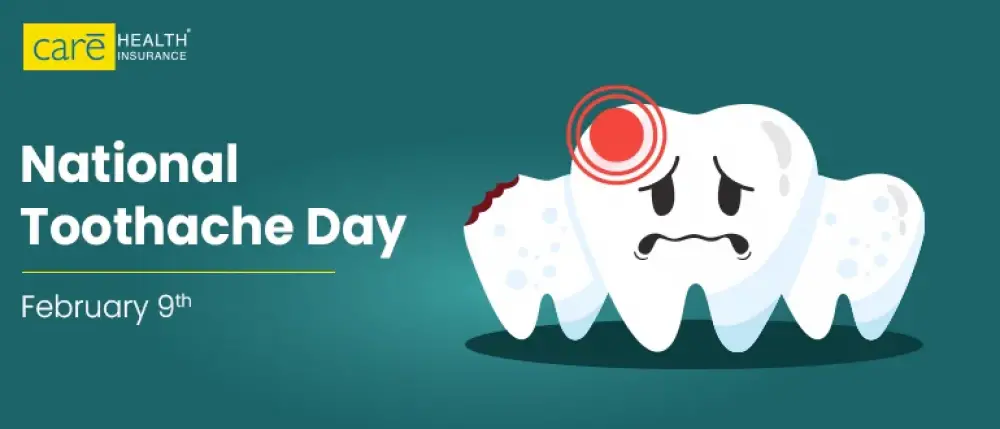Subscribe to get weekly insights
Always stay up to date with our newest articles sent direct to your inbox
Published on 5 Feb, 2025
Updated on 6 Feb, 2025
179 Views
4 min Read

Written by Jyotsana Shekhawat
Reviewed by Rashmi Rai
0Like
Be the First to Like
Every year on February 9th, we celebrate National Toothache Day to raise awareness about the discomfort and pain caused by toothaches. It is a gentle reminder to acknowledge the importance of oral health, dental care, and preventive measures to safeguard teeth against cavities, sensitivity, and tooth decay. Let’s start with the article and discuss all that you need to know about National Toothache Day, how to treat toothaches until your dentist's appointment, and various toothache prevention strategies.
National Toothache Day sheds light on the importance of dental care and oral health–encouraging individuals to adopt healthy practices to ensure absolute fitness. Tooth pain can occur for many reasons, including tooth decay, cavities, gum disease, and sensitivity. However, the ache may also result from far more complex issues like falling out or discomfort after a root canal. National Toothache Day is a day for people to address tooth pain immediately–and seek medical assistance when necessary.
Toothaches are often the result of underlying dental conditions. One of the most common causes of tooth pain is cavities, which occur due to bacteria in the mouth breaking down food particles, leading to tooth decay. Here are the other reasons why toothache happens:
Additionally, toothache can occur due to fractured tooh or a reaction to hot or cold food due to sensitive teeth.
If you are dealing with a toothache and haven’t planned on seeking help from your dentist, here are a few tips for you on dental care and easing dental pain:
Dentists use various methods to address toothaches, depending on the root cause. Below are the treatments employed for dental pain:
Toothaches can be annoying and cause significant disruption in your day-to-day life. However, the silver lining is ensuring proper oral health and dental care, which can prevent conditions like cavities, decay, and more.
Here are the practices that you can adopt to ensure good oral health and avoid toothache:
National Toothache Day comes up as a reminder to be proactive when taking care of your teeth and preventing the discomfort and pain linked with toothaches. The day encourages everyone to engage in practices like maintaining good hygiene, visiting your dentist regularly, getting regular checkups and oral cleanups—and being mindful of eating habits. Moreover, the day also stresses the importance of vigilance towards dental issues and seeking professional help without delay when required.
Just as regular flossing and mindful eating keep you miles away from potential toothache, investing in a health insurance plan can help you steer clear of financial distress should any medical expense arise. Care Health Insurance’s health insurance plans provide extensive coverage and exclusive coupons that cover the soaring expenses that come along with the best treatment. In the end, it is more about prevention than cure.
>> Also Read: Does Health Insurance Include Dental and Vision Care?
Disclaimer: The above information is for reference purposes only. Verifying the policy details and coverage with the official policy documents is essential when purchasing health insurance. Also, kindly consult a professional medical expert to confirm the details of your health concerns.
Be the First to Like
शुगर कंट्रोल कैसे करे? जानें, डायबिटीज में क्या खाना चाहिए Care Health Insurance in Health & Wellness
Thyroid : मामूली नहीं हैं महिलाओं में थायराइड होना, जानें इसके लक्षण और घरेलू उपचार Care Health Insurance in Diseases
हाई ब्लड प्रेशर को तुरंत कंट्रोल कैसे करें? देखें इसके उपाय Care Health Insurance in Diseases
प्लेटलेट्स की कमी के लक्षण, कारण और इलाज क्या है Care Health Insurance in Diseases
World Chagas Disease Day: Understanding Global Health Impact of Kissing Bugs Care Health Insurance in Awareness Days
World Parkinson’s Day: Raising Hope for the Elderly Care Health Insurance in Awareness Days
World Bipolar Day 2025: Understanding Bipolar Disorder and Breaking Stigma Care Health Insurance in Health Insurance Articles
ट्यूबरक्लोसिस (टीबी) के लक्षण, कारण और इलाज Care Health Insurance in Awareness Days